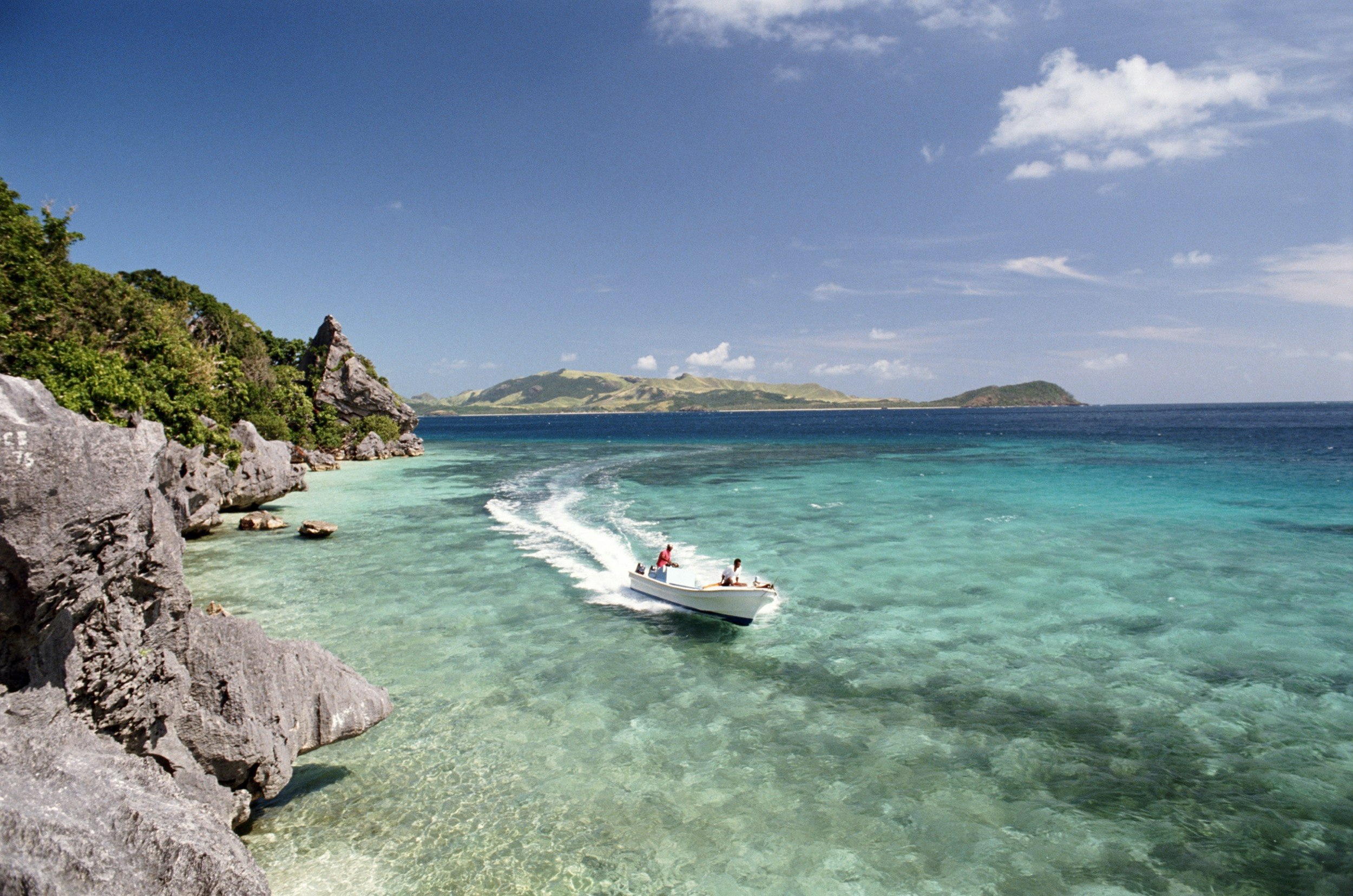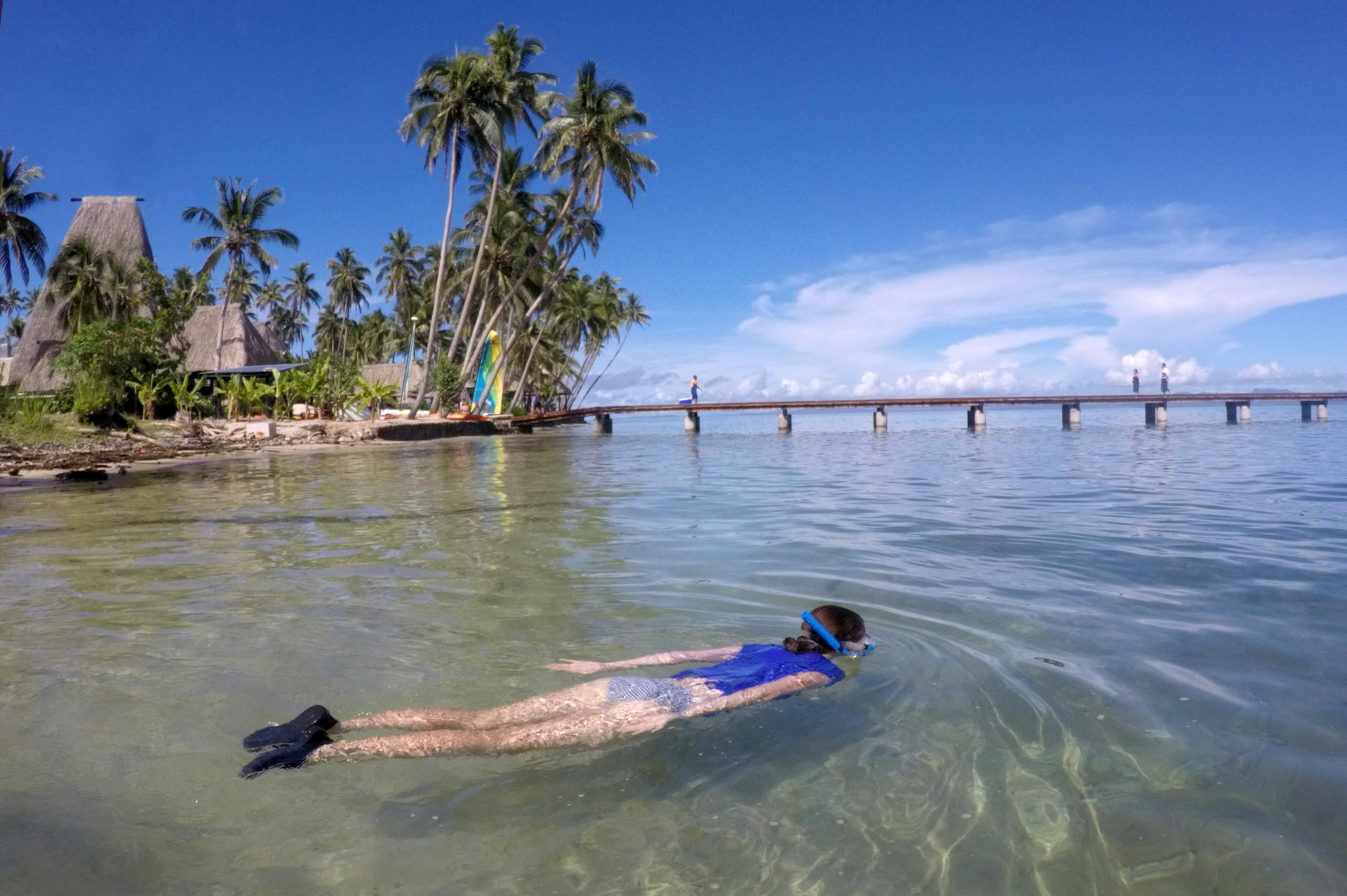There are 333 islands in Fiji‘s archipelago, so choosing the best one for you is an intimidating endeavor.
While you can’t really go wrong no matter which island you choose – there are no bad ones to visit – each one has its own sense of identity, from decadent resort to family getaway or backpacker adventure. Wherever you go, expect the warmest welcome the world has to offer when you step beyond the main tourist hot spot of Nadi.
1. Viti Levu
Best for urban Fiji and family-friendly resorts
The international gateway to the Fijian Islands, Viti Levu offers a sample of everything the country has to offer from international-caliber resort areas like all-inclusive and highly manicured Denarau Island to the mountain village of Navala where locals live in thatched bure (huts).
Families will love the range of quality activities, like kayaking or rafting down the Navua River, ziplining over treetops at Zip Fiji, walking through the Garden of the Sleeping Giant, relaxing on the family-friendly beaches of Natadola and taking a ride on a retired sugarcane railroad in a velocipede with Ecotrax Fiji. The island hosts three of Fiji’s national parks, an escape into the wilderness can be guaranteed.
Dive with resident tiger sharks in Beqa Lagoon, snorkel the thriving reef at Nananu-i-Ra or simply soak in some sun on the dazzling white sands of the Coral Coast – there is a lot to do (or not do) on this island.
The capital Suva is worth a visit to see modern Melanesian life at its liveliest at the Municipal Market, Fiji Museum and air-conditioned shopping malls. Meanwhile, Nadi, the main transport hub, showcases the country’s Indian heritage via its impressive Sri Siva Subramaniya Swami temple, sari shops and plenty of delicious curries. On Viti Levu, you could stay for weeks without making a major dent in the expansive list of all activities on offer.
Planning tip: Although Suva is Fiji’s capital city, all international flights arrive in and depart from Nadi (pronounced nan-di), so you’ll be spending a little time on Viti Levu.
2. The Mamanucas
Best for white-sand islands and surf breaks
Ah, the Mamanucas… here is a near-perfect string of white-sand isles that hover in the blue water like some hallucination of paradise. Most are only an hour or so boat ride away from Viti Levu and they are so picture-perfect that the film Cast Away (2000) starring Tom Hanks was filmed on this chain’s uninhabited Monuriki Island. You can visit it on a day trip.
Meanwhile, famous surf spots like Cloudbreak lure in surfers in search of the barrel of their life while friendlier waves attract those still working on their paddle power. Pristine reefs with sea turtles, reef sharks, rays and resident fish ring around just about every island in the chain, making it a snorkeler’s paradise. When it’s time to dry off, an empty beach is just a paddle away.
Beachcomber Island is known as the reigning party resort island of the country, where bottles of barely chilled Fiji Gold or Fiji Bitter are opened with abandon. Backpackers in the Mamanucas tend to follow a trail that coincides with the Bula Pass, a boat transfer pass that buzzes from island to island. But if you have the cash to spare, there are plenty of upscale resorts that offer champagne beach picnics where privacy is nearly guaranteed.
If you want reliably good weather, brag-worthy photos of white sand beaches and waiters wielding cocktails, the Mamanucas are for you.

3. Yasawas
Best for desert-island-paradise dreams
The Yasawas pick up the glorious tropical tail of the Mamanuca Islands and bring them north to quiet and isolated bliss. A high-speed catamaran or a small plane makes getting there from either Viti Levu or the Mamanucas a cinch and accommodation ranges from five-star resorts to laid-back backpacker digs.
Sparsely populated, the land is relatively dry and the are beaches white. While the Mamanucas got Tom Hanks, the Yasawas got Brooke Shields when the (rather problematic 1980s, don’t ask) film Blue Lagoon was filmed here.
Island hop, explore the clear dark waters of Sawa-i-Lau Cave and snorkel and dive the technicolor reefs throughout the chain. The reef passage between Nanuya Balavu and Drawaqa is frequented by manta rays, although currents can be strong so pick your day.
It can be harder to get a glimpse at Fijian living when you’re stuck to the confines of the sandy shoreline your resort is set on. Fortunately, Waya Island has a village that’s famously hospitable and welcomes guests in search of an authentic island experience.
Detour: Once in the islands, ask at your resort about getting a lift over to nearby islands, or enquire about local water taxis. Often these are local motorboats in varying stages of disrepair (and with scant regard for safety equipment); however, the boat captains know the water, reefs and weather like the back of their hands.
4. Kadavu
Best for off-the-beaten-track adventures
Remote and authentic yet easily accessed by plane or ship from Viti Levu, Kadavu is one of Fiji’s best off-the-beaten-track assets. Eco-adventurers will find happiness at the handful of resorts that grow their own organic produce and work in tune with Kadavu’s villages.
Anywhere you stay, you’ll likely have to get there by boat from the main village passing by prehistoric-looking jungle coves chirping with rare and colorful endemic birds. The east part of the island is fringed by the Great Astrolabe Reef, the fourth largest barrier reef in the world, renowned for its cavern and tunnel-filled underwater landscapes, manta rays and phenomenal fishing.
Planning tip: Each resort has its own boat and will pick up guests from Vunisea airstrip, but make arrangements in advance. Boat trips are expensive due to fuel costs. In rough weather it can be a wet and bone-crunching trip to the more remote resorts.

5. Vanua Levu
Best for exploring traditional villages and diving
High waterfall-strewn peaks are contrasted with bucolic lowlands of sugarcane and coconut plantations on relatively untouristed Vanua Levu.
The main flower-filled settlement of Savusavu attracts sailors and divers with its sheltered green bays and a small selection of shops, bars, restaurants and a marina that doubles as a social club. Outside town are miles of near-empty beaches, some with resorts, some fronted by villages and others only surrounded by jungle. Visitors should rent a 4WD and explore the wilds.
Divers in the know make the pilgrimage to the Rainbow Reef famous for its forests of soft corals. Even more dedicated divers go to the nearby Namena Marine Reserve for the country’s most pristine waters, rife with thousands of fish. Get lucky enough at the right time of year and you might spot a pod of dolphins or migrating whales in the waters around Savusavu.
Planning tip: If you do decide to hire a vehicle to explore more remote parts of this beautiful island be aware that petrol stations are few and far between and almost everything is closed on Sundays.
6. Ovalau and the Lomaiviti Group
Best for historic buildings and offbeat travel
Levuka on Ovalau was once the capital of Fiji and today it’s one of the only towns in the South Pacific with Wild West-style buildings and a Unesco World Heritage listing. Outside of town, hike forested mountains and undeveloped coasts of traditional villages. By bike or by rental car, Ovalau’s road that hugs the coastline is an easy way to feel a thrill of a big adventure without the commitment of a long trip.
Although Ovalau and its smaller sisters lie close to Viti Levu, few visitors make it over here. Islands like Leleuvia, Naigani and Koro have very laid-back accommodations on alabaster beaches, while Wakaya hosts the Wakaya Island Resort and Spa, one of the country’s most exclusive resorts.

7. Taveuni
Best for jungle, waterfalls and hiking
The third-largest island, known as the Garden Island, Taveuni is the lushest, tropical-flower-laden, waterfall-heavy and hiking-friendly island in Fiji. Bouma Heritage National Park encompasses most of the island, meaning most of the forests are protected. There are peaks to ascend and coastlines to wander. A highlight is the Lavena Coastal Walk that follows the forest’s edge for 5km (3 miles) along white and black sand beaches and villages to a waterfall, or there’s a trek to a series of three waterfalls hidden among paths lined with wildflowers.
The Rainbow Reef (see Vanua Levu above) is also accessed from Taveuni and smaller offshore islands like Qamea and Matagi have resorts on sugar sand beaches. Everywhere you go you’ll find accommodation for all ranges from super-luxe to backpacker fun.
Local tip: Taveuni is one of Fiji’s best areas for birdwatching. Over 100 species of bird can be found here. The forested Lavena coast is also a good spot to see orange or flame doves, Fiji goshawks, wattled honeyeaters, and grey and white herons.
8. Lau and Moala Groups
Best for getting away from it all
Want to get way, way out there? The Lau and Moala Groups are Fiji’s frontier islands for visitors, virtually untouched by tourism. Flights and boat services are few but with time, a sense of adventure – and, even better, a sailboat – it’s possible to explore these friendly paradises of blue waters and traditional villages.
In Fulaga you’ll find a turquoise lagoon marked with hundreds of limestone islets and beaches sans footprints. Vanua Balavu also has its own clusters of dramatic islands linked by coral reefs. On Kabara, you can wander through a village with Tongan-influenced architecture and pen a postcard for the monthly supply ship to retrieve.
Elsewhere throughout Lau, discover beaches where coconut crabs are the main inhabitants, explore an overgrown trail to a saltwater lake, search for bats tucked atop limestone caves, and peek at coral reefs that have been undisturbed for millennia.
